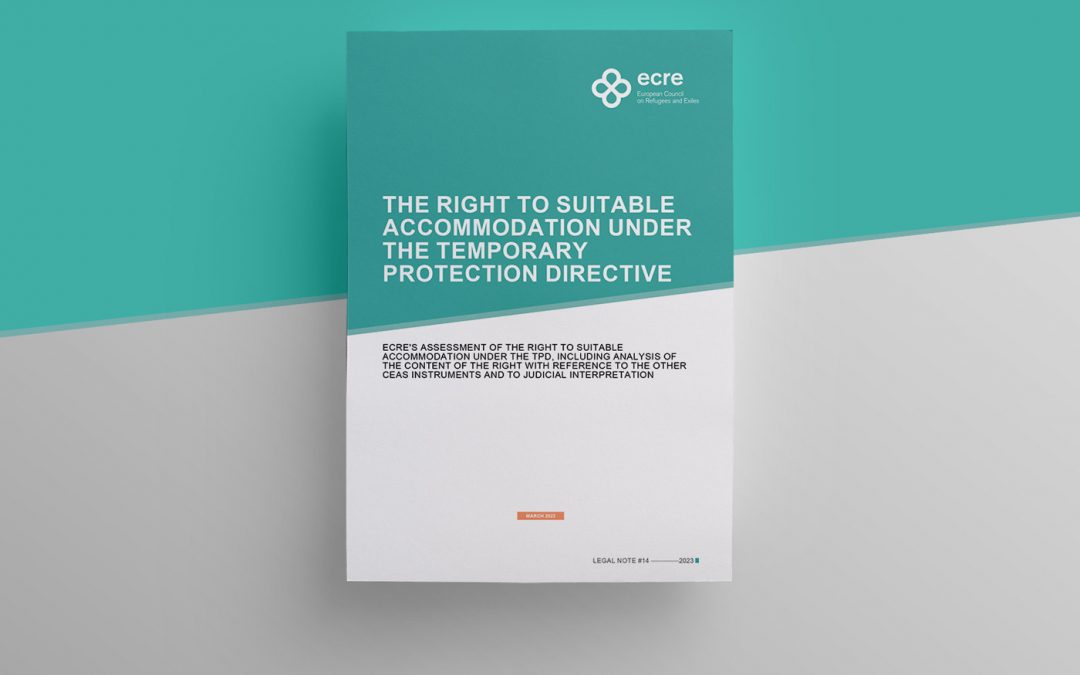This ECRE Legal Note discusses the right to suitable accommodation under the Temporary Protection Directive (TPD). Article 13 of the TPD requires Member States to provide temporary protection beneficiaries (TPBs) with suitable accommodation or means to obtain housing. It also mandates that Member States provide necessary assistance in the form of social welfare and means of subsistence to TPBs who do not have sufficient resources. However, as the Legal Note explains, there no common definition as to what constitutes “suitable accommodation”, leading to diverging interpretation and implementation of the right across the Member States.
The legal note analyses the content of the right in the light of the interpretation of other Common European Asylum System (CEAS) instruments and with reference to judicial interpretation by the Court of Justice of the European Union (CJEU) and to the right to suitable accommodation according to the Council of Europe (CoE) and international law standards.
As the TPD is a first-phase directive and, unlike other instruments, it has not been recast, and due to its very recent activation, it should be interpreted and applied in line with EU primary law, including the EU Treaties and the Charter of Fundamental Rights of the European Union (CFREU). The CFREU sets the main legal protection standards and is applicable when interpreting the right to suitable accommodation under the TPD; Member States have an obligation to ensure that their interpretation of the right is compatible with the Charter.
The interpretation of the right to suitable accommodation by the CJEU states that access to accommodation is a basic need and a core benefit essential for a dignified standard of living under Article 1 of the CFREU. Member States have an obligation to provide accommodation either in kind or as a financial allowance, while also taking into account the vulnerability and special needs of displaced persons. Moreover, according to the Court’s case law, effective remedies must be available for those seeking access to suitable accommodation.
Article 1 of the Charter provides for the right to human dignity which is relevant for the interpretation of Article 13 of the TPD. The right to suitable accommodation is also closely linked to the principle of the best interest of the child and to the right to protection necessary for their well-being under Article 24. The rights of the elderly to live in dignity and independence under Article 25 and the right of persons with disabilities to live in the community with dignity and autonomy under Article 26 are also relevant.
The Legal Note also examines the special needs that apply for certain categories of people. The TPD does not define the form or level of accommodation to be provided. It does, however, indicate that the special needs of displaced persons have to be taken into consideration and that necessary assistance has to be provided to unaccompanied minors and people who have undergone torture, rape or other serious forms of psychological, physical or sexual violence. The proper implementation of the right to suitable accommodation thus implies the assessment of the special needs of TPBs. While there is no established identification mechanism when it comes to the special needs of TPBs, the “minimum standards” that the Directive aims to provide should be implemented in conformity with the established obligations and standards under international law.
The right to accommodation is not explicitly mentioned in the European Convention on Human Rights (ECHR). However, the European Court on Human Rights (ECtHR) interpreted the access to accommodation within the context of Article 8 providing for respect of private and family life, as well as Article 3 on the prohibition of torture and Article 14 guaranteeing protection from discrimination. The ECtHR has consistently emphasized that states have an obligation to ensure that displaced persons have access to suitable accommodation that meets their basic needs.
The interpretation of the right to adequate housing under Article 31 of the Revised European Social Charter (RESC) is relevant to Article 13 of the TPD because both provisions recognise the right of individuals to access suitable accommodation. The case law of the Committee on Social Rights can therefore help to determine what conditions are to be considered adequate and what obligations states have in protecting the dignity and well-being of vulnerable individuals who seek safety and protection by fleeing their homes.
Finally, the right to suitable accommodation also entails procedural obligations for the states to ensure that relevant mechanisms allow temporary protection beneficiaries to have access to the rights guaranteed by the TPD. Effective legal remedies must be available to TPBs and they should have access to the right to be heard and receive a reasoned decision regarding measures affecting them.
Overall, the Legal Note concludes that the right to suitable accommodation is a critical element in ensuring that displaced people covered by the TPD are able to enjoy their fundamental rights and live in dignified conditions.

